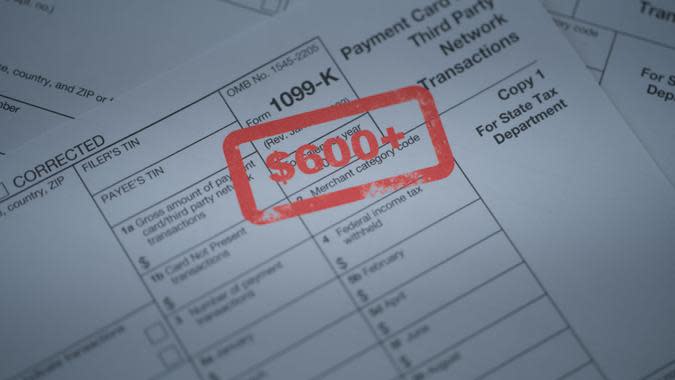Crypto Taxes in 2024: What You Need To Know

Cryptocurrency is still the Wild West of the investment world. Not only are these digital currencies completely intangible, but they fluctuate with such volatility that trading and investing in cryptocurrency can feel more like playing a video game than investing in a real asset class.
Be Aware: IRS Increases Gift and Estate Tax Exempt Limits — Here’s How Much You Can Give Without Paying
Learn More: Owe Money to the IRS? Most People Don’t Realize They Should Do This One Thing
But from a tax perspective, the IRS views cryptocurrency transactions the same as if you were buying or selling stocks, bonds or other financial assets. Whether you trade it or simply use it to buy your morning coffee, here are some important tax-related things you need to know about cryptocurrency.

Yes, Cryptocurrency Is Taxable
Let’s cut right to the chase — yes, cryptocurrency can be taxable, depending on what you do with it.
The IRS views cryptocurrency as a capital asset, meaning there are taxes to be paid on any gains. But other actions can also trigger tax on cryptocurrencies, and you should be prepared to declare any such transactions when you file your taxes.
Find Out: This Is the One Type of Debt That ‘Terrifies’ Dave Ramsey
See More: Top 7 Countries With Zero Income Tax

Cryptocurrency Is Taxed as a Capital Gain If You Sell It
If you buy crypto and then sell it, from a tax perspective, you’ll be taxed the same as if your cryptocurrency was a stock. In other words, you’ll pay short-term capital gains tax if you held the security for one year or less, and you’ll owe long-term capital gains tax if you held your position for longer than one year.
The long-term capital gains tax rate is more favorable for most taxpayers, as it tops out on most transactions at 15%. For single filers with an AGI of $41,675 or less — or $83,350 or less for joint filers — the long-term capital gains rate drops to 0%. Short-term capital gains, on the other hand, are taxed at your ordinary income tax rate.
Explore Next: Trump-Era Tax Cuts Are Expiring — How Changes Will Impact Retirees

You’ll Owe Tax If You Use Cryptocurrency To Purchase Something Else
Planning to use your crypto to purchase things like your daily latte or some new clothes? You’d better plan on recording the details of that transaction as well because it’s likely to be taxable. If you use crypto to purchase goods or services, you’re technically converting your crypto into dollars and then using those dollars to make your purchase.
In other words, the IRS views purchases with crypto as sales of crypto. If your crypto is worth more than when you bought it, that transaction becomes a taxable gain.

Mined Crypto Is Taxed as Ordinary Income
If you successfully mine cryptocurrency, you’re rewarded with coins or tokens for your efforts. In a sense, you’re being paid a financial reward for the work you do for the blockchain.
The IRS views these payouts as taxable income, and you’ll owe ordinary income tax on the value of what you receive, even if you don’t sell it. If you do ultimately sell that cryptocurrency, you might also be subject to capital gains taxes if its value has risen since you received it.
Trending Now: The 7 Worst Things You Can Do If You Owe the IRS

Buying Crypto With US Dollars Has No Immediate Tax Consequence
If you simply buy cryptocurrency, you won’t have to report that transaction to the government, and there is no taxation involved. Theoretically, you can avoid taxation on your cryptocurrency forever if you simply hold it. You’ll only be taxed on your cryptocurrency if you sell or exchange it at a gain in the future.

Will My Crypto Exchange Send Me Tax Information?
Yes. According to TokenTax, crypto exchanges are required to issue Form 1099-MISC to customers that have earned at least $600 of income through their platform during the tax year in tax year 2023.
What if you do not receive this form? The IRS said taxpayers must still report income, gain or loss from all virtual currency taxable transactions on their federal income tax return for the taxable year of the transaction. Take care to record all of your transactions, especially when it comes to calculating taxable gains or losses.
Check Out: A Look at Tax-Filing Options and Costs

What Tax Forms Will I Need To File?
Your crypto transactions, including amounts and dates, should be reported on Form 8949. Ultimately, this information will transfer to your Schedule D, where all of your capital gains and losses will appear.
Crypto you earned from mining should usually appear on Schedule C if you’re running your mining operations as a business. In this case, you’ll likely be liable for self-employment tax as well. If you can demonstrate that crypto mining is simply a hobby, you’ll report that crypto income on Line 8 of Schedule 1.
Additionally, as mentioned above, you will be issued Form 1099-MISC by crypto exchanges if you earned $600 of income through your platform during the tax year.
Obviously, as crypto taxes can get complicated, you’ll likely want to consult with a tax advisor for specific answers regarding your crypto tax filing questions.

Taxpayers Must Report All Digital Asset Related Income for Tax Year 2023
For tax year 2023, the IRS said taxpayers must answer a digital asset question and report all digital asset related income when they file their 2023 federal income tax return.
This should be fairly expected for taxpayers, however, since this was also a requirement for filing 2022 federal tax returns.
Heather Taylor contributed to the reporting for this piece.
More From GOBankingRates
Dave Ramsey: Why You Shouldn't Buy a New Car/Take Out an Auto Loan This Year
5 Reasons You Should Consider an Annuity For Your Retirement Savings
This article originally appeared on GOBankingRates.com: Crypto Taxes in 2024: What You Need To Know
